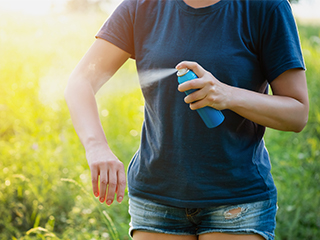What’s the Buzz About Bug Spray?

By: LISA GOLDBERG KEITHLEY, M.D.
Summer’s here and as you shop for insect repellant, you will be faced with a choice: Should you get one with synthetic (man-made) ingredients or one that is “natural”?
Some people worry that synthetic materials used in sprays – such as DEET and picaridin ‒ may be harmful. Others claim that natural sprays don’t work well, so why use them?
Here’s what you need to know about choosing a product that will safely keep biting beasties away this summer.
Synthetic sprays
The most popular bug sprays at your local store will probably have the chemicals DEET or picaridin as their main active ingredients.
DEET is one of the most effective repellants available. It works well against mosquitoes (up to 12 hours), ticks (up to 4 hours) and other insects. The Environmental Protection Agency has approved DEET for both adults and children 2 months and older, but frequent and heavy use may cause skin irritation. For adults, look for products that contain 15%-30% DEET, but kids 12 and under should use a product with 10% DEET or less.
Picaridin is made from piperine, the alkaloid that gives pepper its peppery characteristics. It is odorless to humans but smells repulsive to insects such as mosquitoes, ticks, fleas and flies. It keeps mosquitoes away for up to 8 hours and ticks for up to 5 hours. Picaridin is slightly milder than DEET, and skin irritation is less likely. Look for spray products, which generally work better than lotions or wipes, containing 20% picaridin.
Natural sprays
Natural insect sprays use plant-based substances instead of man-made ones. Not all natural sprays work equally well, so here’s what you need to know.
Oil of lemon eucalyptus is one of the most effective natural ingredients. It keeps away some ticks, flies and gnats, but it’s most useful against mosquitoes (up to 6 hours). Though it is natural, it isn’t recommended for kids under age 3. Look for products with 30% oil.
Sprays containing 2% soybean oil have been shown to provide up to 4 hours of protection against mosquitoes. Soybean oil is safe to use on infants and children.
Unrefined essential oils such as citronella, geranium and rosemary are promoted as all-natural repellants. But despite their popularity, they typically only work for about half an hour, and then the bugs will be back.
So what works best?
For the best protection against biting insects, choose a spray with synthetic DEET or picaridin. They repel a greater variety of bugs and stay effective longer. This is especially true if you live in an area heavily infested with mosquitoes.
If you prefer a plant-based product, and you live in an area where mosquitoes are less of a problem, sprays containing oil of lemon eucalyptus or soybean oil may give you adequate protection.
Besides using bug spray, see these tips from the CDC for preventing bug bites.
 Dr. Keithley cares for patients in the Arnold office. She received her medical degree from Drexel University College of Medicine and is certified by the American Board of Family Practice.
Dr. Keithley cares for patients in the Arnold office. She received her medical degree from Drexel University College of Medicine and is certified by the American Board of Family Practice.





